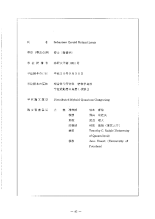Distributed hybrid quantum computing 分散型ハイブリッド量子情報処理
この論文にアクセスする
この論文をさがす
著者
書誌事項
- タイトル
-
Distributed hybrid quantum computing
- タイトル別名
-
分散型ハイブリッド量子情報処理
- 著者名
-
Sebastien Gerald Roland Louis
- 著者別名
-
セバスチャン ジェラルド ロランド ルイス
- 学位授与大学
-
総合研究大学院大学
- 取得学位
-
博士 (情報学)
- 学位授与番号
-
甲第1201号
- 学位授与年月日
-
2008-09-30
注記・抄録
博士論文
There are numerous proposals for the physical realization of a quantum<br />computer. However, distributed approaches, making use both of flying and<br />stationary qubits, seem to constitute the most promising route towards a<br />truly scalable device. Such systems guarantee extendibility, they incorpo-<br />rate the interface with communication applications and relax the physical<br />realization of the device, allowing for defect tolerance. Flying qubits are<br />included in the more general concept of a quantum bus, a mediating sys-<br />tem which can be of higher dimension. Such a quantum bus can be used<br />in the straightforward preparation of a standard multi-qubit resource en-<br />abling measurement based quantum computation, the cluster state. This<br />constitutes the framework for the results presented in this thesis.<br /> We begin by investigating the effects of dissipation in the continuous<br />variable bus scheme known as the qubus scheme. By considering loss in the<br />bus as it mediates interactions between the stationary qubits, we obtain an-<br/>alytical results for the effective action of the induced quantum gate. We find<br />that a particular two-qubit gate operates with high fidelity in the presence<br />of moderate loss and give a simple iteration scheme to simplify the effects<br />of loss on the qubits. We then attempt to reduce these effects by preparing<br />the bus in more elaborate state, however no improvements are observed.<br /> We then apply the qubus scheme to the probabilistic generation of cluster<br />states and develop an entangling gate working with high success probability.<br />This allows us to produce cluster states far more efficiently than other pro-<br />posals. Investigating new methods to analyze the performance of different<br />generation strategies constitutes the second part of this set of results. We<br />begin by making the large flow approximation, used in queuing theory, to<br />obtain the optimal strategy in a regime with large resources. After what<br />we take the other more familiar limit of single cluster growth and introduce<br />absorbing Markov chains as a key mathematical tool.<br /> Finally we look at the transmission of composite quantum systems via a<br />single higher dimensional bus. We provide generalized protocols and inter-<br />actions guaranteeing a full transfer of the information from one composite<br />system to another. These protocols can also serve information process-<br />ing tasks, as useful logical operations can be applied to the data as it is<br />transfered. We notice lastly that the qubus scheme constitutes a potential<br />physical realization.
application/pdf
総研大甲第1201号

